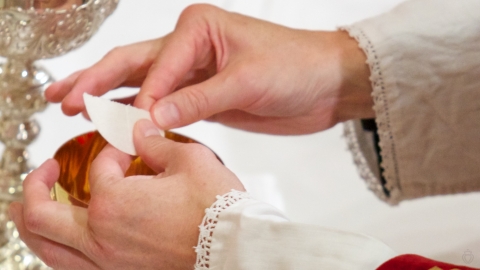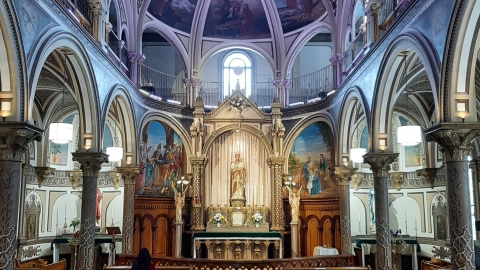Interview with Fr. Troadec: In the Service of Priestly and Religious Vocations
After 23 years as the head of the St. Curé d’Ars Seminary in Flavigny, France, Fr. Patrick Troadec will become the prior of Brest next August 15. DICI asked him what lessons he learned from his many years consecrated to the formation of the future priests and brothers of the Society of Saint Pius X.
DICI: In August you will leave the post of director of the Flavigny Seminary that you have occupied since 1996. During this long period, you have met an impressive number of seminarians and brothers, true?
Fr. Troadec: Indeed, I have welcomed 459 seminarians and brothers during my term, an average of 20 young men per year.
Can you give some details on the origins of the candidates for the priesthood and the religious life?
Flavigny Seminary, like all those of the Society, is international. This is not an empty word. Indeed, among the seminarians and brothers, three quarters are French, the others came mainly from Switzerland and Italy, but also from other European countries like England, Ireland, Scotland, Poland, Spain, and Portugal. I have also welcomed Africans, Americans, and even a young man from Sri Lanka.
Is there a certain type of family at the origin of vocations?
The seminarians come from families of 6 children on average. Three-quarters of the French have been trained in fully Catholic schools and the vast majority have their mothers at home. The Church has always favored large families, encouraged stay-at-home mothers, and insistently urged that children be trained in completely Catholic schools. An analysis of the origins of the candidates for the priesthood and the religious life confirms the soundness of these prescriptions.
Where do those who have reached the priesthood minister?
Nearly 40% are priests abroad, spread across 18 countries. Half of them are in Europe and the rest on other continents. There are some in the United States, Canada, Mexico, Argentina, Gabon, Kenya, South Africa, Zimbabwe, Singapore, Australia, and New Zealand. With his Catholic sense, Archbishop Lefebvre wanted the Society to come to the aid of the faithful around the world, requesting its presence to ensure the salvation of their souls.
Have you seen any differences between the young men you have welcomed in recent years and those you trained 20 years ago?
Most of the seminarians have received exceptional graces during their childhood and adolescence, which has allowed them to harmoniously develop the grace of their baptism. They have often been protected from the world. Nevertheless, they are young men of their time and the world left an imprint on some of them. When I was a seminarian, Archbishop Lefebvre said that we were touched by the prevailing liberalism. Likewise today, our contemporaries’ way of life spills over in part on our world.
Arriving in Flavigny, I spoke of a “fast-food mentality” that affected some seminarians, i.e., a difficulty with grasping difficult subjects. It was already necessary to express ideas in a simple way so as to make them understandable. Eight years later, I have observed what could be called a “zapping trend,” that is, the desire not to stay long on the same subject, linked to a recurrent desire for change, and for about eight years, some of our young men have been affected by what I call the “click era,” i.e., the desire to have an answer for everything immediately. The peasants knew that there is a time between sowing and harvesting, but today those familiar with Google forget this fundamental fact of nature.
Fortunately, the exceptional geographic surrounding of Flavigny Seminary makes it possible for the seminarians to return to reality, living far from the computer world, and being bathed in an atmosphere conducive to contemplation.
What is the specificity of the first year of the seminary?
The seminary’s rules were designed by the wisdom of the Church to forge balanced temperaments. The main object of the first year is the search for an intimate union with God. One of the conditions for acquiring it is silence. God speaks in silence; the atmosphere of the seminary is a silent atmosphere. The silence of the seminary is not a void, but a plenitude. In addition, silence makes it possible to unite the advantages of solitude with those of a communal life.
Another characteristic of seminary life is the liturgical life. Now, as St. Pius X said, the liturgy is the first source of the Christian spirit. There are graces specific to each feast. Seminarians are in the best position to receive them.
Another important element for future priests is communal life. The Society of St. Pius X is a society of communal life. Seminarians are trained in the practice of virtues through mutual support. The fact of living with other young men animated with the same ideals is a valuable help for seminarians. Among them, there is a great diversity, a source of enrichment—some are eighteen, others are older; some only have a baccalaureate, others have advanced studies; some are born in Tradition, others are converts. There are, as I said, Frenchmen and foreigners. There is, therefore, a wide range of seminarians and brothers, which makes life very pleasant.
Now, we should not idealize seminary life. There is no mystical life without ascetic life; there is no union with God without renunciation. To be happy at the seminary, one must be generous and give oneself without reserve. There are concessions to make to get along with people who are so different, because if the differences between seminarians can be a source of enrichment, they can also generate disagreements. Also, Archbishop Lefebvre gave this invaluable advice: “[The seminarians] will strive to give all the same esteem, the same devotion, especially during recreation and outings. They will always consider what unites them more than what separates them... Man cannot live on illusions, this happiness is bought through obedience, abnegation, humility, forgetting oneself, and true zeal for the reign of Our Lord.”
Among the seminarians, you have spoken of converts. Are there regularly those who knock on the door of the seminary and how do they discover us?
After a period when recruitment was done almost exclusively from Tradition, regularly, for about ten years, young men not from a traditional background have been knocking on the door of the seminary.
Most discover us through the Internet and many have first come through Tridentine Mass communities sponsored by diocesan bishops.
What helps these young men come to us?
In general, the two terms that spontaneously come to the mind of the candidates for the St. Curé d'Ars Seminary to justify their entry into the Society are: “coherence” and “Archbishop Lefebvre.” The young men who knock on the door of the seminary appreciate the doctrinal rigor of the Society and its freedom to denounce the errors that have infiltrated the Church since the Second Vatican Council and which are ongoing at present.
Moreover, having listened to Archbishop Lefebvre’s sermons or having read some of his works, they have been conquered by his spirit of faith, as well as by the depth and simplicity of his words. They see in him a man of God chosen by Providence to lead souls on the way to Heaven in the sorrowful context of the crisis that the Church has been going through for 50 years.
You mentioned 20 seminarians and brothers who enter the seminary on average. The number of vocations stagnates, while there are more students in proportion in the Society’s schools today than 20 years ago. How can you explain the difficulty of fostering vocations?
There are several parameters that explain this stagnation. The most important factor without a doubt is access to the Internet which distracts the souls from the essentials by enclosing them in the secondary, the superficial, the ephemeral, the accidental, the event, the immediate, etc. The digital invasion produces disaster among our contemporaries. It prevents the development of the interior life. To this is added, alas!, the major problem of impurity that defiles so many teenagers and even children with improper and even provocative images in so many films and advertising. The more we concede to the life of the flesh, the more we cut off the life of the spirit. St. Paul says that “the sensual man perceiveth not these things that are of the Spirit of God” (I Cor 2:14).
Another major obstacle to the emergence of vocations is criticism. The French are very critical. But criticism of priests removes in an adolescent the desire to give himself to God. The child believes and obeys; the adolescent admires and chooses. But criticism of priests kills admiration among young people.
The internal difficulties that the Society has experienced has certainly contributed to slowing the impetus of young men toward the seminary. Although this is not quantifiable, it is undeniable. The demon is the great divider; it is up to us not to play his game.
What advice would you give to parents to encourage the emergence of vocations in their homes?
It seems to me that the two essential points for favoring vocations are summed up in the spirit of piety and sacrifice.
The spirit of piety is born naturally in the child when he sees that God occupies the first place in his family. When the child finds that his parents’ big decisions are taken under the gaze of God; when he sees that trials are endured with a supernatural spirit; when he realizes that his parents have a high opinion of priestly and religious vocations; when he sees them being respectful of priests; when he hears them say good things, these things naturally engender in him an esteem for vocations. By breathing the supernatural perfume from an early age, the child acquires a supernatural instinct, which greatly facilitates his receptivity to the call of God. Of course, family prayer, so much recommended by Pope Pius XII, is part of this guideline, as well as pilgrimages, attendance at ordinations or the taking of the cassock, and also daily reading of books on the spiritual life.
In the spirit of piety, it is important that young people also join in the spirit of sacrifice. Parents must communicate this spirit by being steadfast in the face of their children’s whims and by inciting them to renounce not only forbidden things, but also certain permitted things in the spirit of expiation for so many sins committed in the world. The lack of a spirit of sacrifice makes a man vulnerable and leaves him without resistance, especially before impure vices. Paul Claudel said to his friend Jacques Rivière, “It is said that youth is made for pleasure; in reality, it is made for heroism.” Youth is not made for pleasure, because pleasure is not an end in itself. As soon as a man seeks pleasure for himself, he seeks himself, he feeds his selfishness, he seeks to satisfy himself, and he gradually sinks into narcissism. Man is not made to take; he is made to give; he is made to give himself to follow after the good Shepherd who gave His life for His sheep. This is why seminarians and priests faithful to their vocations are so radiant. Let us develop in our young people the spirit of piety and sacrifice to enable them to resist evil and find their happiness in God.
The assistance at the holy sacrifice of the Mass is the means par excellence to promote the spirit of piety and the spirit of sacrifice. Seeing all that Our Lord has endured for us during His Passion, seeing Him immolate Himself on our altars, encourages us to follow Him on the path of virtue that is the path to Heaven.
What would you say to young people to help them discern the will of God?
I would first invite them to get a spiritual director. In fact, one of the best ways to help young people discern the will of God is spiritual direction. This helps them discover the beauty of a life of union with God and put in place a strategy to fight against the old man. I would also encourage young men to take part in a good youth movement. A good movement helps develop self-giving and creates missionary zeal. Finally, I would advise young people to make a spiritual retreat at least every two years. The retreat setting is conducive to the development of the interior life and helps to put oneself in the most favorable conditions to hear the voice of God.
You spoke of the priestly vocation. But in Flavigny, you also had the responsibility for the formation of the brothers. What is their proper spirituality?
The brothers are religious. They make the three vows of poverty, chastity, and obedience, and are assistants to the priests. They share their life of prayer and community and relieve them in a variety of tasks such as the responsibility for the sacristy, for the direction of the choir, for the garden, or for the various work around the house.
Among those I have welcomed, today 35 are professed brothers, 30% of whom are abroad. They are very precious, especially in schools, but also in priories and even in the seminaries.
By their regularity, they are a support for the priests. In school, they are excellent intermediaries between the children and the priests and allow the latter to have a more profound effect on the students. In the priory, they greatly support the prayer life and are highly appreciated by the priests. It was for me a great priestly joy to see the development of the brothers’ vocations in the Society.
Even today, young men have the qualities to be excellent brothers but do not enter into this way of life through ignorance of the nature of this vocation or for fear of not fitting in with the demands of this state of life. It is true that the spirit of independence breathed into the world does not encourage the emergence of this vocation either. I earnestly hope that priests and parents will always put more value on the beauty of this vocation in order to strengthen in the Society the religious spirit that Archbishop Lefebvre wanted to transmit to it. Fortunately, we also have the grace of having the Sisters of the Society who are also precious assistants for us!
You will leave the seminary for a priory. This will be a big change for you!
Yes, that’s true. I will be in a post similar to the one I knew before being at Flavigny, but since the Society’s primary mission is the priesthood and all that relates to it, I will transmit to Brest, to the families and to the children the basics that will allow, I hope, new vocations to appear in the young people. My next mission will therefore be directed toward the priesthood and what its reason for being, the holy sacrifice of the Mass from which we receive all the graces of redemption.
Séminaire International Saint-Curé-d’Ars, Maison Lacordaire, F-21150 Flavigny-sur-Ozerain
(Source : FSSPX/MG/DICI – FSSPX.Actualités – 06/27/2019)



